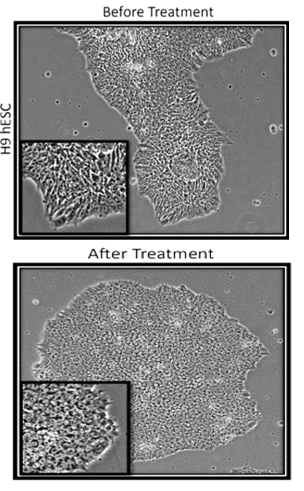Improved Growth of Stem Cells in Culture
Background
Pluripotent stem cells (PSC) divide (self-renew) indefinitely in culture, and they have the ability to differentiate into any of the cells found in an adult. PSC have many important potential applications in biology and medicine that range from diabetes to spinal cord injury. While culture media for PSC have improved over the last decade, there are still problems with existing media and improvements need to be made. A major problem with existing commercially available media is that they do not reliably hold the PSC in an undifferentiated, pluripotent state.
Brief Description
Prof. Talbot and her colleagues from the University of California, Riverside have developed a research tool to prolong the viability and pluripotency of stem cells in culture. The culture medium is supplemented with an additive that includes a source of acetate ions, a carboxylic acid, or a salt of the carboxylic acid, or a combination of these substances. Results have shown that this substrate medium allows for less stem cell death, faster colony growth, and causes cells to attach to and spread faster on the substrate. This provides tremendous advantages in stem cell colony morphology, growth, survival, maintenance of pluripotency, and dynamic behavior when compared to existing media.

Fig 1: Images of stem cells in culture before and after treatment
Applications
- To facilitate improved stem cell growth
- To improve the reliability of stem cell culture to maintain cells in the undifferentiated state
Patent Status
| Country | Type | Number | Dated | Case |
| United States Of America | Issued Patent | 10,370,637 | 08/06/2019 | 2016-186 |
Contact
- Grace Yee
- grace.yee@ucr.edu
- tel: View Phone Number.
Other Information
Keywords
stem cells, cell culture
